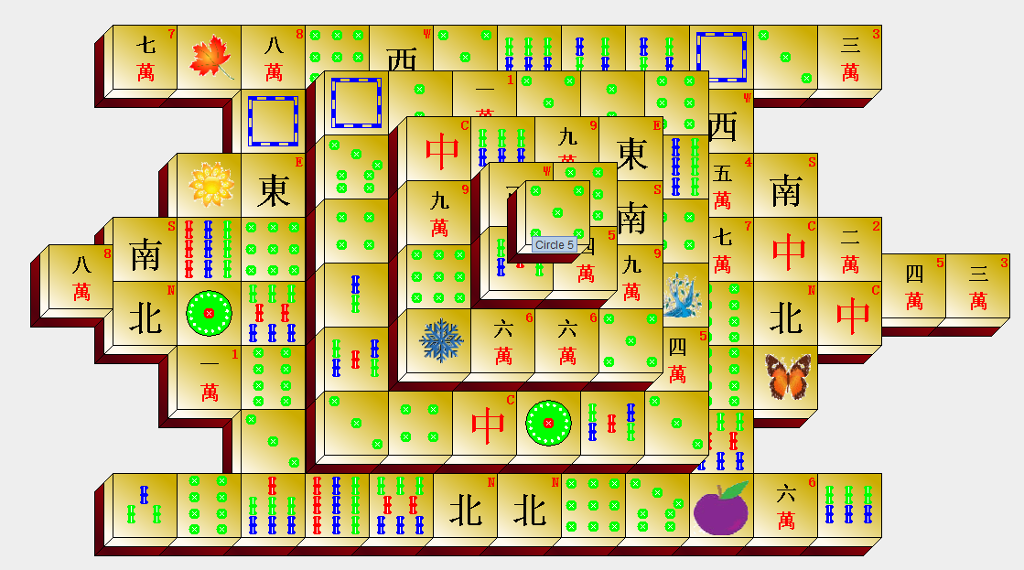Question
JAVA ... Im creating a mahjong game . I'm storing the tile objects in a 3 dimensional array. I need to figure out a way
JAVA ... Im creating a mahjong game . I'm storing the tile objects in a 3 dimensional array. I need to figure out a way to determine which tiles are clickable or not. clickable is defined as.. Clickable is defined A clickable tile does not have a tile on top of it or on either its left or right side.
Below Is the code that im using to draw out my mahjong game board, and then a jpg of how it is currently printing out the game board when i run the game
private void fillGameBoardArray(){
int i=0;
Collections.shuffle(tilesArrayList);
for(int z = 0; z
for(int y = 0; y
for(int x = 0; x
if(boardMap[z][y][x] == 1){
//read board map and place tile onto board at spot
board[z][y][x] = new TileContainer(tilesArrayList.get(i),x,y,z);
System.out.println("board z "+z+"board y "+y +"board x "+x + board[z][y][x].getTile());
i++;
//randomizedTiles.remove(1);
} else {
//or place an empty piece
board[z][y][x] = new TileContainer(false);
}
}
}
}
}
private void drawTiles(){
int zOrder = 0;
for(int z = Z_AXIS - 1; z >= 0; z--){
for(int y = Y_AXIS-1; y >= 0; y--){
for(int x = 0; x
if (board[z][y][x].isTile()){
Tile t = board[z][y][x].getTile();
//Handle Special Cases
if(x==0 && y==4 & z==0){
//Left most tile
t.setBounds(x * (100-30) + (z*10) + 70, y * (100-35) - (z*20) - 30 + 20, 100, 100);
} else if(x==14 && y==3 & z==0) {
//Right most tile
t.setBounds(x * (100-30) + (z*10) + 70, y * (100-35) - (z*20)+30 + 20, 100, 100);
} else if(x==13 && y==3 & z==0) {
//2nd right most tile
t.setBounds(x * (100-30) + (z*10) + 70, y * (100-35) - (z*20)+30 + 20, 100, 100);
} else if(x==6 && y==3 & z==4) {
//Top center
t.setBounds(x * (100-30) + (z*10) + (35) + 70, y * (100-35) - (z*20) + (40) + 20, 100, 100);
} else{
t.setBounds(x * (100-30) + (z*10) + 70, y * (100-35) - (z*20) + 20, 100, 100);
}
setComponentZOrder(t, zOrder);
board[z][y][x].setZOrder(zOrder);
zOrder ++;
System.out.println(t);
final int[] c = {x,y,z};
t.setCoords(c);
t.addMouseListener(new MouseAdapter() {
@Override public void mousePressed(MouseEvent e) {
Tile temp = (Tile)e.getSource();
System.out.println(temp.getParent());
System.out.println(temp.getParent().getComponentZOrder(temp));
if(isClickable(c[0], c[1], c[2])){
{
if(first == null)
{
first = temp;
first.setClicked(true);
repaint();
revalidate();
return;
}
else if(temp==first)
{
temp.setClicked(false);
first=null;
repaint();
revalidate();
return;
}
second = temp;
if(first.matches(second))
{
remove(first);
remove(second);
first=second=null;
repaint();
revalidate();
}
repaint();
revalidate();
}
}
}
});
add(t);
//System.out.println(getComponentZOrder(t));
}
}
}
}
}
}
here is what the gameboard looks like when i run the game.

Step by Step Solution
There are 3 Steps involved in it
Step: 1

Get Instant Access to Expert-Tailored Solutions
See step-by-step solutions with expert insights and AI powered tools for academic success
Step: 2

Step: 3

Ace Your Homework with AI
Get the answers you need in no time with our AI-driven, step-by-step assistance
Get Started


